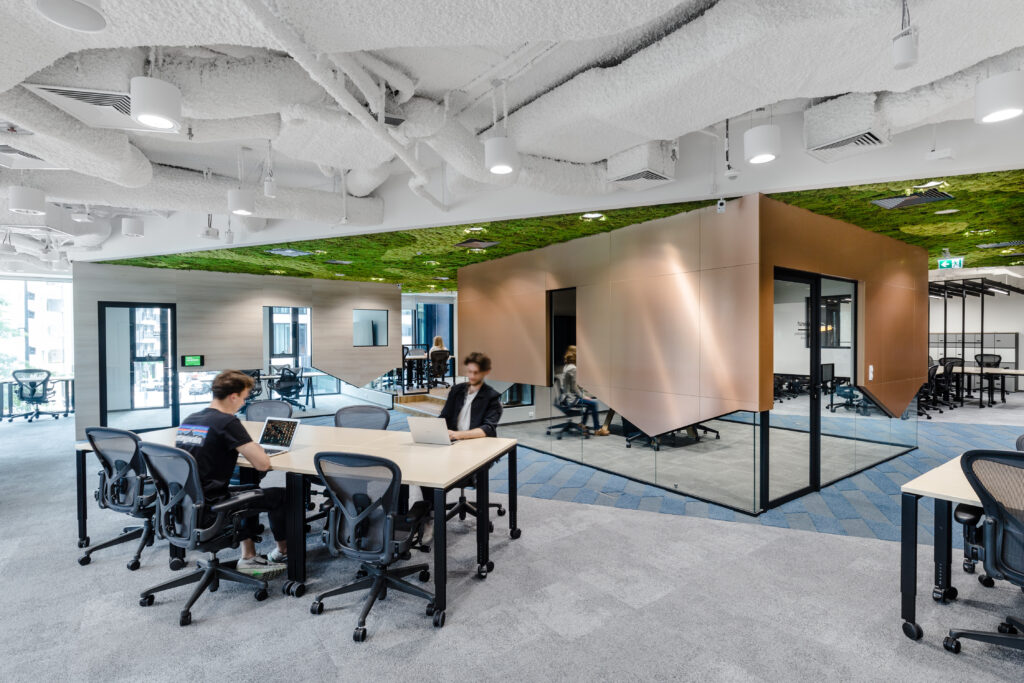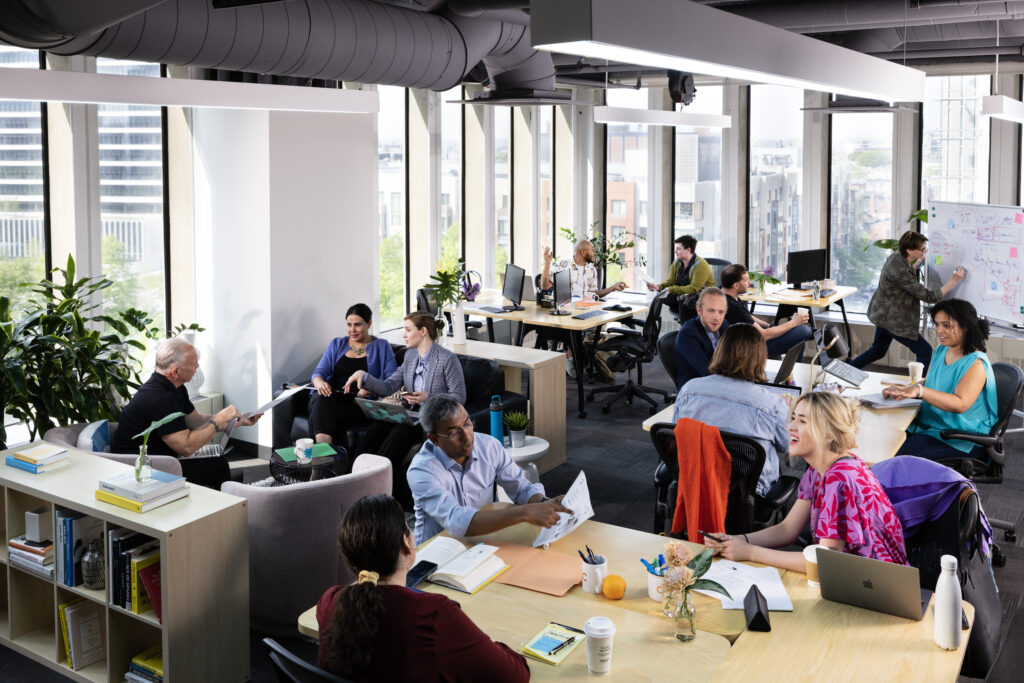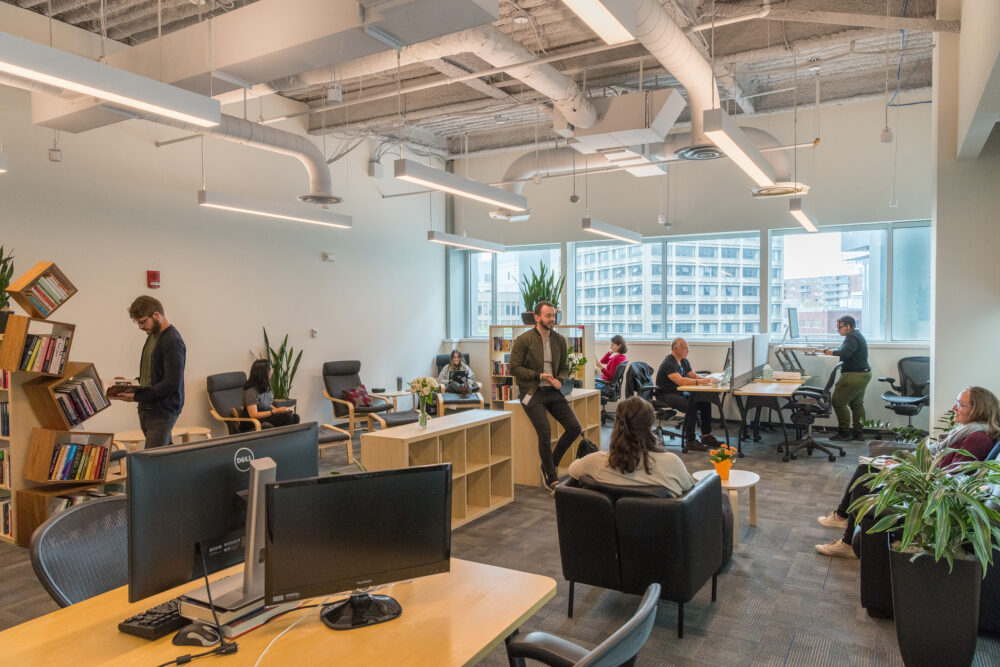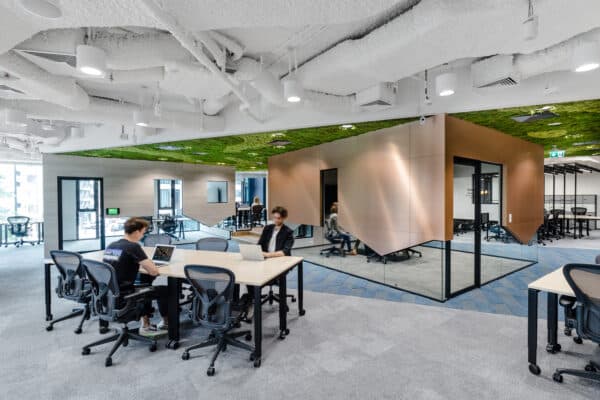Reading this while sitting in a coffee shop or a library could be considered coworking. If you have a dedicated desk in a shared office space, that is coworking, too.
Coworking is a general term describing a place or style of work in collaborative settings where space and resources are shared by workers who are often employed by different organizations or even in different industries. This differs from a traditional office setting, where one company has control over the entire leased space.
The number of coworking spaces worldwide has grown 10-fold since 2018, and is anticipated to continue an upward growth trajectory. While it may seem like coworking spaces are mostly for solopreneurs or remote workers, companies of all sizes and stages use this type of workspace to accommodate work needs.
Below, we answer six common questions about coworking, flexible shared workspace, and making decisions about your organization’s workspace needs.
Is coworking the same thing as flexible, shared workspace?
Coworking and flexible, shared workspace are often used interchangeably, especially as coworking has become a go-to generic term for shared workspaces. But there is nuance between the two concepts.
Similar to how all squares are rectangles but not all rectangles are squares, coworking is a type of shared workspace. Flexible shared workspace, on the other hand, offers many more options that can be tailored to the needs of pretty much any type of organization.
One of the primary benefits of flexible space, like that offered by CIC, is that your space can grow and change with company needs. There are a number of operational benefits as well, particularly when it comes to harnessing the power of community.
These spaces can be more cost-effective than a traditional office lease because of shared overhead and because these spaces are often furnished. There may also be access to additional amenities such as shared specialized equipment that may be cost-prohibitive for some companies.
Coworking is a type of space offered by externally managed flexible workspace providers, but not every flexible workspace is a coworking space. CIC, for example, offers coworking space, dedicated desks, and private offices and suites to suit the needs of different types of companies. Businesses find flexible space attractive if they do not want to be locked into an office space for many years through a traditional office lease.

Who uses coworking or flexible space?
Coworking and flexible space can be used by employees and businesses of all shapes and sizes, including:
- Individuals – freelancers, researchers, independent contractors, remote workers or those traveling for work
- Growing startups
- Small to medium-sized businesses
- Large organizations that require a satellite office for presence in a certain market or to accommodate employees in other geographic areas
- Hybrid enterprise organizations that do not need dedicated desk space for every employee, but still want centralized space(s) for employees to work on collaborative tasks
- Multinational companies expanding into a new international market. Programs like Japan Desk and CIC International Soft Landing in partnership with ProColombia offer support and resources
Why do people use coworking or shared workspace?
At its core, coworking can create a sense of community among professionals who can learn from each other and inspire new ideas. You never know where a conversation you strike up in the kitchen could lead.
The benefits of shared workspace are not merely anecdotal. Wide-ranging research has found the power of physical proximity on innovation and collaboration and the impact of feeling a sense of community on employee performance, highlighting the importance of workspaces that create connections among people to produce better, more innovative, and collaborative results.
The offshore wind cluster at CIC Providence is a prime example of how flexible, shared workspace can support progress for entire industries. “Companies may come here when they can only afford one desk or temporary space, and then they get involved, network, and grow. And the industry is better for it, too,” said Drew Carey, vice president of Americas for Venterra Group, a global offshore wind services company and CIC Providence member.
Shared workspace providers often offer programming and networking events with like-minded professionals, which can also lead to greater innovation. “We’ve heard that some companies we support have met their business partner at CIC or through Venture Café events,” shared Minji Kwon, a researcher with the Korea Health Industry Development Institute (KHIDI).
KHIDI facilitates international expansion for Korean healthcare companies and shared that the welcoming community at CIC and events help the companies they work with build connections and become more ingrained in the local community.

What do workspace trends indicate about the future of coworking?
In today’s business world, flexibility is key for both workers and employers. More than half of employees working remote capable jobs prefer, and expect, to work in hybrid settings in 2024, up from 32% in 2019 and anticipated to continue climbing into 2025.
At CIC, we’ve been following this shift closely and have found that the need for in-person collaborative spaces is growing for hybrid work models.
As Stacey Messier, GM of New England for CIC, shared in a recent blog post, “The key for strategic workspace decision-making today is a flexible approach that takes into consideration employee work styles, how the physical work environment is used, and how the organization is set up to roll with the punches in a continuously evolving business world.”
More hybrid work has meant rethinking office space needs, with organizations reporting earlier in 2024 the intention to spend resources optimizing their spaces for hybrid work this year. Shared office space provides the upside of coworking, including intentional community building, and numerous benefits for businesses of all sizes.
Nearly one in five respondents in Redefining the Workspace to Strategically Support Corporate Culture, Innovation, and Growth report said their business is considering leasing or is actively in the process of leasing entire floors or office spaces in externally managed flexible workspace or coworking space. In the same report, an additional 14% of respondents shared that their businesses are renting individual desks or meeting rooms in these types of work arrangements.

Does CIC offer coworking?
CIC is purposefully designed to offer companies and organizations flexible office and lab space that supports innovators and fosters connection. Spanning 1.5M square feet of space across North America, Europe and Asia, CIC innovation campuses offer workspace solutions for teams, whether in-person or hybrid, include:
- Private office space and suites
- Designated desk space
- Coworking space
- Shared lab space
- Private lab space
- Event space
A leader in building and enabling innovation clusters, CIC also offers programming and events in support of robust innovation ecosystems.
How do I find the right type of office or lab space for my business?
Every business is unique, but choosing the right workspace should always be aligned with your business strategy. Consider factors such as access to talent, proximity to others within your industry, and growth plans.
According to a report from Harvard Business Review Analytic Services, some of the most important factors reported by organizations that choose to use flexible workspace include:
- Location (66%)
- Cost (63%)
- Facilities/amenities (39%)
- Flexibility of the contract (38%)
The future of coworking and externally managed, flexible workspace centers on creating hybrid solutions for teams that allow for collaboration and flexibility. Explore our blog for advice about strategic workspace decision-making, the future of work, and the power of intentional, innovative business communities.




